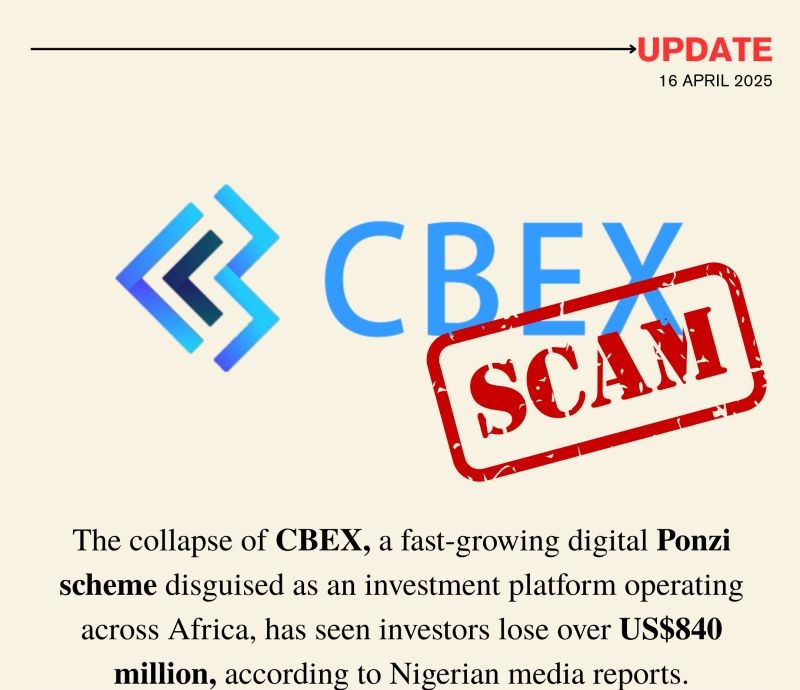The CBEX fraud case is a recent and significant Ponzi scheme scandal that has rocked Nigeria’s digital investment landscape. CBEX, also known as CryptoBank Exchange, was a digital asset trading platform that promised Nigerian investors an unrealistic 100% return on investment within just 30 days. This promise attracted a large number of investors, estimated between 250,000 and 300,000 Nigerians, many of whom lost substantial amounts of money when the platform collapsed in April 2025.
How CBEX Operated
CBEX claimed to be a global cryptocurrency trading platform leveraging advanced Artificial Intelligence to generate profits. It purportedly traded twice daily, showing users fake profit charts and balances, but there was no real trading activity behind the scenes. The platform operated a referral system that incentivized users to recruit others, often requiring them to refer up to 12 people before being able to withdraw funds. Withdrawal delays and penalties were imposed, including a “verification fee” introduced shortly before the collapse, further trapping investors’ money on the platform.
Despite claims of international offices and registrations, including a supposed U.S. FinCEN registration and Canadian presence, these were either unsubstantiated or outright fake. The genuine Beijing Equity Exchange in China denied any affiliation with CBEX, which had rented an office in Ibadan, Oyo State, Nigeria, to appear legitimate. The Securities and Exchange Commission (SEC) of Nigeria confirmed that CBEX was never registered or approved to operate, making its activities illegal under Nigerian law.
Scale of the Fraud and Financial Impact
Initial reports suggested that CBEX defrauded investors of about ₦1.3 trillion (approximately $822 million). However, detailed blockchain analysis by Techpoint Africa estimates the actual deposits into CBEX-related wallets and smart contracts to be around $6.1 million, indicating that the higher figure might be exaggerated or unverified. It is also unclear if all deposits were from Nigerians alone. The platform’s sudden suspension of withdrawals and eventual collapse left many investors unable to access their funds, sparking nationwide outrage.
Regulatory and Law Enforcement Response
The Economic and Financial Crimes Commission (EFCC) of Nigeria had been investigating CBEX even before its collapse. Following the platform’s failure, the EFCC intensified its efforts, collaborating with international agencies including Interpol and the FBI to track down the masterminds behind the scheme, who are believed to include both foreign nationals and Nigerian partners. The EFCC aims to recover lost funds where possible and prosecute those responsible. The SEC has also issued warnings about unregistered trading platforms and emphasized the legal requirement for registration under the Investment and Securities Act, 2025.
Public Reaction and Wider Context
The collapse of CBEX has caused significant distress among investors, some of whom stormed and vandalized the CBEX office in Ibadan. The case highlights a recurring problem in Nigeria, where Ponzi schemes repeatedly lure citizens with promises of quick and high returns, exploiting economic hardships and financial literacy gaps. Previous schemes such as the MMM in 2016 similarly caused massive losses. Experts note that the allure of rapid profits continues to drive people into such scams despite widespread warnings.
Summary
| Aspect | Details |
| Platform Name | CBEX (CryptoBank Exchange) |
| Operation Start | Around July 2024 |
| Modus Operandi | Ponzi scheme with fake AI trading, referral bonuses, fake registrations |
| Promised Returns | 100% monthly return |
| Estimated Losses | Reports vary: ₦1.3 trillion (~$822 million) claimed; blockchain analysis estimates ~$6.1 million |
| Number of Investors | Estimated 250,000 to 300,000 Nigerians |
| Legal Status | Unregistered, illegal under Nigerian law |
| Investigating Bodies | EFCC, Interpol, FBI, SEC |
| Public Reaction | Protests, vandalism of offices, nationwide outrage |
The CBEX fraud case serves as a stark reminder of the risks associated with unregulated digital investment platforms in Nigeria and underscores the need for increased financial literacy, regulatory enforcement, and vigilance among investors

